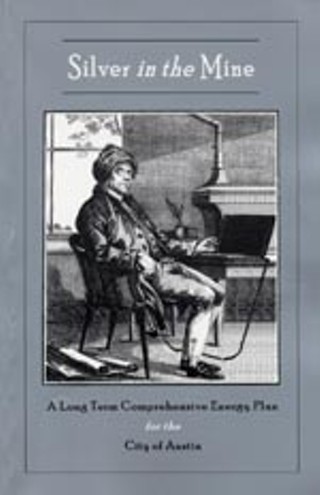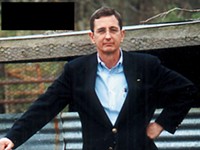A Blue-Sky 'Silver' Plan for Austin Energy
Austin Energy and a former city employee team up to publish an idealized, clean-energy vision of the future.
By Mike Clark-Madison, Fri., Dec. 5, 2003

There's long-range plans aplenty floating around Austin Energy these days. There's the "real" AE long-range strategic plan, presented to the City Council last week in executive session and slated for a public hearing today (Thursday). And then there's the "ideal" plan -- a book, actually, called Silver in the Mine, authored by futurist and former city Resource Management Commission Chair Michael Osborne and published by Austin Energy last month. (You can get a copy, for free, at BookPeople or at AE headquarters on Barton Springs Road.)
Silver in the Mine takes its title, and much of its inspiration, from cover boy Benjamin Franklin ("Genius without education is like ...") -- an appropriate role model for Osborne's project, which presents its blue-sky vision of a sustainable, carbon-free future as not only the right thing to do, but the thrifty, practical, Franklin-esque choice. Of course, if it were quite so simple to convert Austin Energy to a coal-free, nuclear-free, renewables-based electric utility by 2028, as Osborne envisions, then the utility would have not needed the real-world plan it has presented at City Hall.
But Silver in the Mine does a fine job of laying out why reasonable people -- including the Austin Energy execs who commissioned the project, using state and federal "Comm-unities of the Future" grant funds -- would want AE to travel that route. Osborne makes a convincing defense of the "contrarian" argument that fossil fuel production is near its possible peak and that the price increases AE customers have already seen (in the natural-gas-based utility fuel charge) are the harbinger of the future. He likewise leaves pretty large holes -- though perhaps unintentionally -- in the argument that Austin Energy must be "conservative" to compete with for-profit utilities, or that declining air quality and global warming are tolerable costs of economic prosperity. "Moving toward a decarbonized sustainable utility may ultimately prove to be the new conservative approach," he writes, "of the successful electric utility of the future."
Actually, transforming Austin Energy's resource base to one built on solar and hydrogen -- along with corollary investments and advances in energy-efficient green building and renewables technology -- is perhaps the least radical element of what Osborne terms a comprehensive energy plan for the city, not just the utility. (Those are all things AE does right now, although on a modest scale.)
What Osborne outlines is much broader -- the transformation of Austin Energy from a li'l ol' Central Texas public power company to a titan of the emerging clean-energy industry, one that just happens to be owned by Austin's citizens. He notes, accurately, that nothing in AE's existing mission statement precludes it from becoming, say, a solar-cell manufacturer or a contractor that converts other utilities' fossil fuel plants to hydrogen or biomass. (If there are other legal impediments, he suggests, the city could create another entity to take over that role for Austin Energy.)
But the biggest paradigm shift Osborne suggests involves transportation, which in his Austin of the future would be almost entirely electrified, part of a "unified energy system" where battery- or fuel-cell-powered vehicles (whether personal or public transport) would, when parked, become electrical generators on a two-way distributed grid. That is, your (zero-energy, solar-equipped) home could power your car, and vice versa. He points out that, right now, the horsepower of the cars that park around Central Austin for every UT home game at Memorial Stadium represents twice the generating capacity currently owned by Austin Energy.
None of this is going to happen, Osborne aptly and repeatedly notes, unless the city and its citizens want it to, and make bold, though not foolhardy, commitments. As AE showed with its surprise embrace this week of ambitious solar goals, such commitments are not so bold for the city to refuse to contemplate. "The electric utility industry did not exist 100 years ago," AE's Roger Duncan, who commissioned Silver in the Mine, writes in its preface. "Yet most of us just assume that large power plants, poles and wires ... are the way we have always met our power needs." The electricity business, he continues, "is very unlikely to remain in its current form as our society rushes into the new century. ... It is my hope that this book will stimulate the public discussion on what is possible in our energy future."
Got something to say on the subject? Send a letter to the editor.










